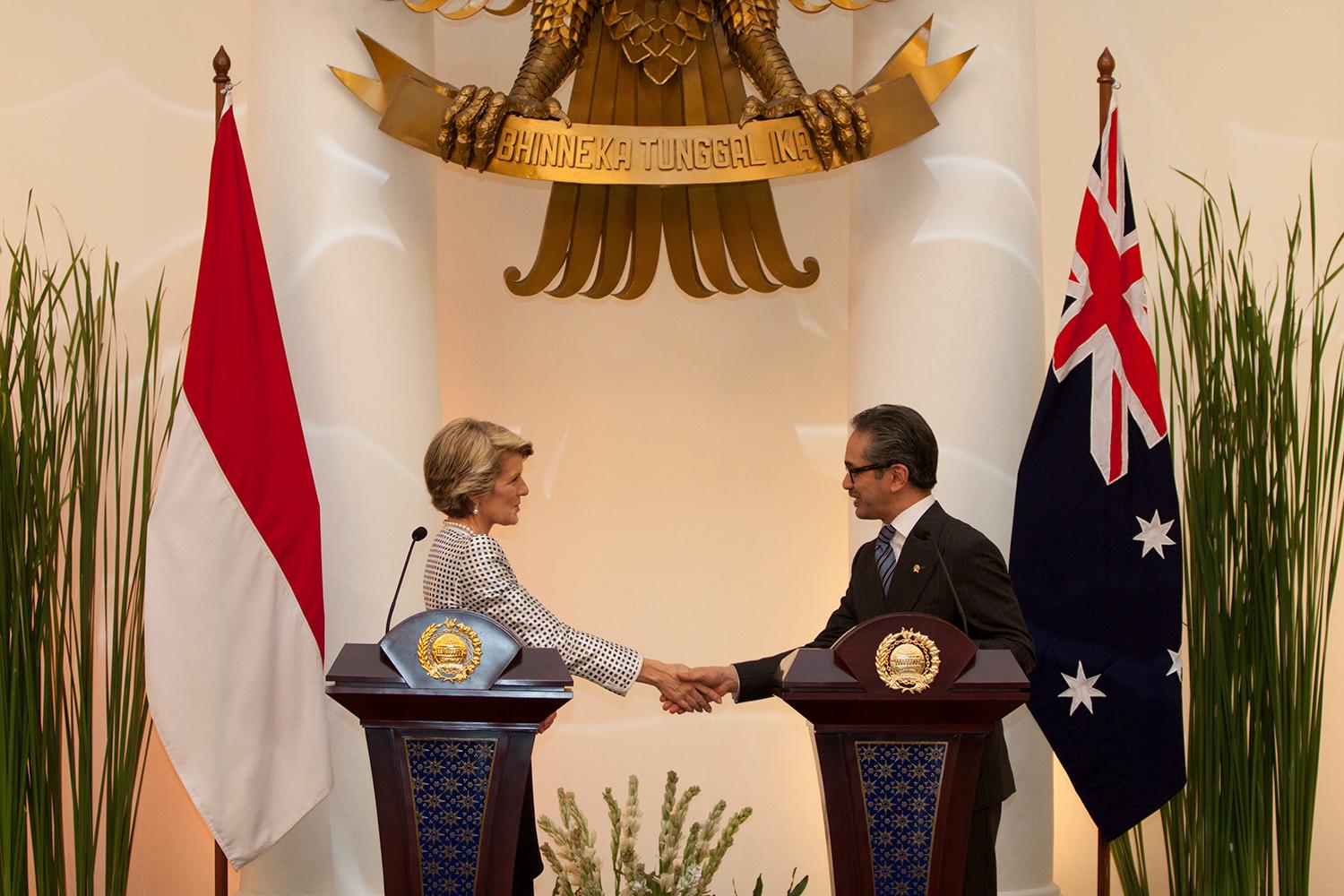Is Indonesia’s next Marty Natalegawa … Marty Natalegawa?
Posted By Natalie Sambhi on June 27, 2014 @ 06:00
Indonesia has just had its third presidential debate in which both Joko Widodo and Prabowo Subianto outlined their respective foreign and defence policies (you can watch the English-dubbed version here [2]). As Michael Bachelard has observed, Australia hasn’t featured in particularly favourable terms [3]. While that might seem ominous for diplomatic relations, the president is just one part of Indonesia’s foreign policy machinery—other parts matter. How Australia fares, for example, will also depend on the kind of foreign minister the new president appoints. But who might that be?
The current minister, Dr Marty Natalegawa, is an enthusiastic practitioner of Indonesia’s foreign policy objectives. The perfect wingman for President Yudhoyono’s ambitious agenda for Indonesia, he’s personally chased down agreements between ASEAN states, and by no means has he been a shrinking violet on Australia and spying. Marty will leave big shoes to fill. With a new Cabinet to be sworn in, who might replace him?
The most obvious answer is Marty himself. Being a technocrat with no overt political affiliations, Natalegawa’s track record of success makes him an ideal candidate to bring experience and continuity to the role. That would suit either president, though lingering questions about Prabowo’s involvement in the kidnapping of student activists could undermine Indonesia’s ability to push human rights agendas. Natalegawa has been instrumental in positioning Indonesia as a partner for Myanmar and fostering the latter’s political changes. Under a Prabowo presidency Indonesia’s ability to act as a third party between Myanmar and other partners like the US, might be constrained. With a relatively sedate Vice President in Boediono, Natalegawa has emerged as one of the more prominent figures in Yudhoyono’s Cabinet (though a more active Vice President like Jusuf Kalla might change that dynamic).
Another option might be the former Indonesian Ambassador to the United States, Dino Patti Djalal. Djalal recently stepped down from his role in Washington in order to run as a presidential candidate for the incumbent’s Democrat Party. With the race now between Prabowo and Jokowi and the Democrats out of the running, Djalal could also be considered for the role of foreign minister. An old hand in foreign relations and son of influential international-law-of-the-sea expert and UNCLOS architect Hasjim Djalal [4], he was also President Yudhoyono’s speech writer for major international addresses in English. With his Washington stint commencing in August 2010, he’s been around for the US rebalance and has, arguably, a good understanding of Western states’ policies.
The last figure is Arif Havas Oegroseno [5], the current Indonesian Ambassador to Belgium. Instrumental in negotiations that led to the conclusion of a maritime agreement between Indonesia and the Philippines, Oegroseno has been actively writing about South China Sea issues in the media [6] in recent months, even going so far as to clarify Indonesia’s position as a ‘claimant state’ [7] (which makes him sound more like a foreign minister than ambassador).
Of course, there are other possible contenders (including Retno Marsudi [8], Mahendra Siregar [9] and Rizal Sukma [10]) but these are just some examples of the kind of foreign minister Australia might expect. An ideal Indonesian foreign minister from the Australian perspective would be one that shares our desire to strengthen ties with Jakarta and with ASEAN states across a number of realms. In an era of Snowden revelations, an ideal counterpart would be one that looks for creative ways to add ballast to the relationship, to better weather diplomatic shocks. Key to that would be the personal rapport between foreign ministers. Despite his posturing, Natalegawa has worked towards the Code of Conduct between Australia and Indonesia which provides the foundation for future crisis management.
Looking more broadly to Indonesia’s role in international affairs, the ideal candidate would maintain a commitment to consolidating Indonesia’s place as leader and third-party mediator in ASEAN; prioritise mechanisms to diffuse tension and mitigate conflict in the South China Seas through a negotiated Code of Conduct; and create opportunities for diplomacy and cooperation between major regional players, particularly, the US and China. Australia and Indonesia might also look to harmonise and reinforce the importance of international law in the resolution of South China Sea disputes.
Under SBY and Marty, Indonesia has shaped its reputation as a good international citizen and active diplomatic player. A successive administration would be hard-pressed to deviate from such a sound framework.
Personalities will be key to continuing that legacy. The three named above all come from a cohort known as ‘Hassan’s boys’ [11], referring to a generation of Indonesia’s ‘youngest and brightest’ diplomats groomed by Hassan Wirajuda, who served as foreign minister from 2001 and 2009. If nothing else, that shows the influence of individuals on Indonesia’s foreign policy. It’ll be interesting to see who follows.
Natalie Sambhi is an analyst at ASPI and editor of The Strategist. Image courtesy of Minister for Foreign Affairs, The Hon Julie Bishop MP [12].
Article printed from The Strategist: https://aspistrategist.ru
URL to article: /is-indonesias-next-marty-natalegawa-marty-natalegawa/
URLs in this post:
[1] Image: https://aspistrategist.ru/wp-content/uploads/2014/06/bishop-natalegawa.jpg
[2] here: http://www.youtube.com/watch?v=lEAdmLMzdy4
[3] Australia hasn’t featured in particularly favourable terms: http://www.smh.com.au/world/both-sides-in-indonesias-presidential-race-see-australia-as-a-problem-20140623-zsj4k.html
[4] Hasjim Djalal: http://www.thejakartapost.com/news/2014/04/21/hasjim-djalal-standing-a-maritime-nation.html
[5] Arif Havas Oegroseno: http://embassyofindonesia.eu/ambassador/
[6] about South China Sea issues in the media: http://thediplomat.com/2014/06/how-indonesia-and-the-philippines-solved-their-maritime-dispute/
[7] clarify Indonesia’s position as a ‘claimant state’: http://www.themalaysianinsider.com/sideviews/article/indonesias-role-in-south-china-sea-dispute-arif-havas-oegroseno
[8] Retno Marsudi: http://www.thejakartapost.com/news/2012/01/11/retno-lp-marsudi-going-dutch0.html
[9] Mahendra Siregar: http://www4.bkpm.go.id/contents/general/117103/profile-of-chairman#.U6ySHLuXSF0
[10] Rizal Sukma: http://www.csis.or.id/profile/rizal-sukma
[11] a cohort known as ‘Hassan’s boys’: http://www.thejakartapost.com/news/2009/10/12/hassan039s-boys039-shape-ri039s-current-diplomacy.html
[12] Minister for Foreign Affairs, The Hon Julie Bishop MP: http://foreignminister.gov.au/photos/Pages/DisplayAlbum.aspx?MinisterID=4&Album=Visit%20to%20Indonesia%2C%20December%202013
Click here to print.
